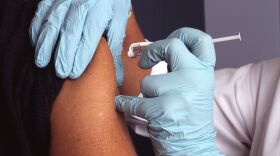It turns out plenty of parents are willing to go sit through an in-person vaccine education session at their local health department, in order to get their kid a school vaccine waiver for religious or philosophical reasons.
That’s what happened in the years after the state passed an administrative rule in 2015, when Michigan had one of the highest vaccine exemption rates in the country.
Before then, parents could just get the waivers at school, and could cite religious or philosophical objections, whether because of their deeply-held beliefs, or just because they’d fallen behind on their kid’s vaccination schedule and getting a waiver was convenient in the moment.
So the state started requiring parents who wanted nonmedical exemptions to “receive education regarding the benefits of vaccination and the risks of disease from a local health department (LHD) before obtaining the certified nonmedical waiver form through the LHD,” according to the state health department. “An updated waiver must be presented each time the child's immunization status is reported.”
Even before COVID, the stakes were high, the researchers noted:
"In 2019, US measles outbreaks primarily occurred in areas with high rates of religious exemptions, including Orthodox Jewish communities. The states most affected were New York, Washington, California, and Michigan. In New York, statewide measles vaccination coverage for children in prekindergarten through 12th grade was 98%, well above the threshold thought to be sufficient to confer herd immunity... however, the outbreak occurred in schools with a measles vaccination rate of 77%, illustrating how heterogeneity can lead to outbreaks even when overall coverage reaches herd immunity thresholds. In March 2019, an infectious person traveled from New York to Michigan, initiating the largest measles outbreak in Michigan since 1991."
And at first, it seemed like it worked.
“Immediately after the rule change rates of NMEs [nonmedical exemptions] fell by 32%,” a new study from the University of Michigan finds. But since then, they’ve been rebounding.
"However, NME rates rebounded in subsequent years, increasing by 26% by 2018,” researchers found, after analyzing kindergarten exemption numbers in recent years.
But while waivers have been rising steadily in the wake of the rule change, they’re still lower overall than they once were.
“The 2020 overall waiver rate is 29% lower than in 2014, with about 11,000 waivers reported compared to the over 25,000 waivers reported in schools in 2014,” according to a report by the Michigan Department of Health and Human Services. “Compared to 2014, the 2020 kindergarten waiver rate has decreased by 30%, the seventh grade rate has decreased by 33.3%, and the new entrant rate has decreased by 28.9%.”
Parents in 2020 were also more likely to cite philosophical, rather than religious, reasons for the exemption. And the rates of both are higher among private school families than those whose children go to public school.
“People are clever, people are motivated, people have strongly held convictions,” said Jon Zelner, an epidemiology professor at U of M and one of the paper’s co-authors. “And within a couple of years [from the rule change] they just kind of came through different channels of exemption.”
“So to me, this is kind of a ‘nudge’ type of policy,” he said. “It’s just like, ‘Oh, it's a little bit harder.’ You have to go to the health department to get your exemption instead of just doing it at your local school. And I think this kind of demonstrates that those, you know, often don't necessarily work.”
That could offer a lesson for the post-2020 pandemic era. If schools, health systems, or other institutions are going to require COVID vaccinations, they’re going to need to allow as little “wiggle room” as possible, Zelner said.
“Being explicit and being clear and being honest about why we're doing these things, and why we're taking a hard line, and being careful about choosing a hard line on things that matter is really what we need to do,” he said. “And we can't use a sledgehammer in every situation...But things like COVID vaccination in health care settings, schools, places where you're going to be interacting with vulnerable populations like jails and prisons? To me, that's a no brainer.”






